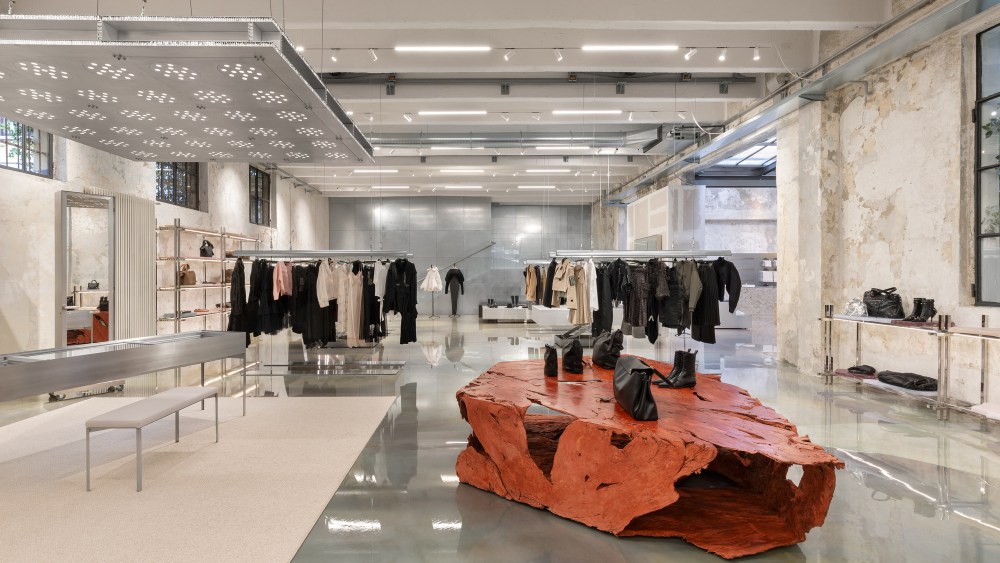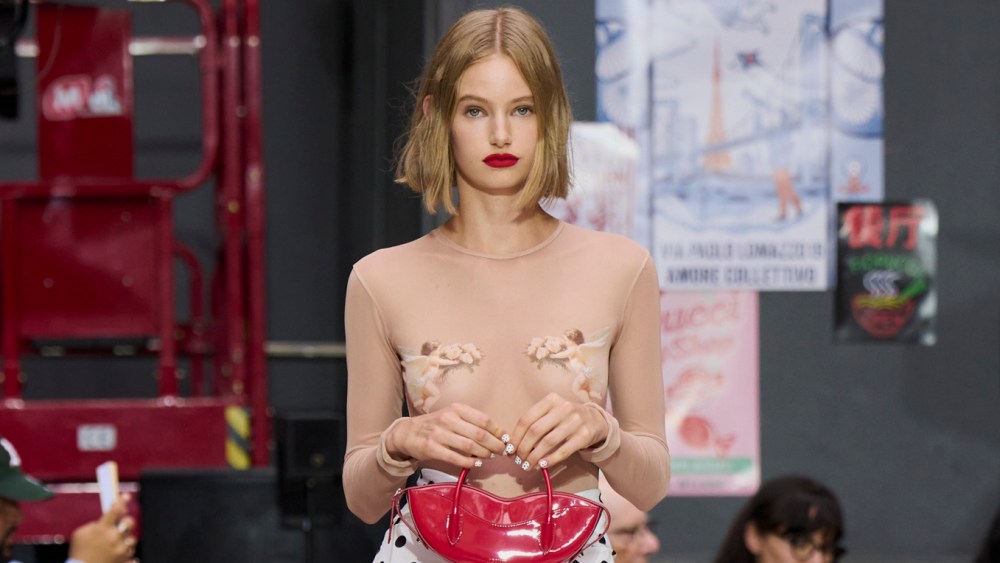MILAN — The restyling of 10 Corso Como will be officially unveiled Tuesday evening together with the exhibition “Gut” dedicated to American artist Talia Chetrit.
Gianluca Borghi, chief executive officer of the concept store since May, said proudly in an exclusive interview that the store is reopening as one of the few selected retailers of Phoebe Philo’s collection of ready-to-wear, leather goods and accessories. The store is carrying the brand’s third edit, alongside pieces from the first two edits, released in October last year and in March 2024, respectively, and the third one is an exclusive in the Italian market.
Carrying Philo’s collection “is consistent with our values and our identity,” he said, adding that “10 Corso Como has always been a pioneer, anticipating trends, carrying established and emerging brands at the same time. Our vocation is to support the development of new ideas, which include intangibles, art and design exhibitions.” Philo’s connections to the art world dovetail with this concept, he added.
You May Also Like
In another first, the store now carries jewelry collections selected by owner Tiziana Fausti and characterized by small-scale local production. These include jewels by Hum and Shihara from Japan; Sophie Buhai and Nikolle Radi from the U.S.; Charlotte Chesnais, Lah and Tamara Taichman from France; Grainne Morton and Hotlips by Solange from the U.K.; Bibi van der Velden from the Netherlands; Lia di Gregorio from Italy, and Yannis Sergakis from Greece.
Borghi highlighted the element of research involved in searching for “exclusive, rare brands, which are not only precious but also innovative in terms of design.” Prices range from 100 euros to 10,000 euros.
Borghi, who was previously vice president of retail North America at Montblanc, and during his career has held executive roles in retail, digital business and wholesale at Gucci, Pomellato, Boucheron and Rinascente, is spearheading the international development of 10 Corso Como with Fausti. Founded in 1991 by Carla Sozzani, the landmark Milan retailer was acquired by Fausti in September 2020 and unveiled the first signs of its all-encompassing renovation work at its historic location in Milan by opening the revamped Galleria and Project Room spaces in February during Milan Fashion Week.
Commissioning Site-Specific Art
The new store concept was conceived by interdisciplinary agency 2050+, founded by architect and curator Ippolito Pestellini Laparelli, a former partner at OMA and president of the international jury at the 2023 Venice Biennale Architecture Exhibition.
Site-specific works were commissioned from international designers Jesper Eriksson, Laurids Gallée, Odd Matter, Sam Chermayeff Office and The Back Studio. Austrian designer Laurids Gallée designed a polished metal structure paired with shelves crafted from upcycled resin plates similar to stylized rock specimens; the Rotterdam-based design studio Odd Matter created two display tables and a cash desk, exploring the use of recycled glass strands and alpha crystalline plaster; Sam Chermayeff Office, formed by Sam Chermayeff and Barbara Polakova, designed the jewelry displays in the windows, and Eugenio Rossi and Yaazd Contractor of The Back Studio designed Assemblage n.48, a lamp made with a lightweight aluminum structure supporting a tubular of fiery red and hand-blown neon, positioned inside the new staircase leading to the first floor.

Other pieces of furniture are the Glissière benches by Heim + Viladrich, founded by Lauriane Heim and Johan Viladrich, inspired by the brutalist forms of highway concrete barriers.
Marseille-based artist Jesper Eriksson created a counter made of complex black coal, to be positioned in the menswear area, which will be completed in January.
Borghi described the design of the store as “a sort of flexible theatrical machine, interacting with the artists as a dynamic platform for cultural and creative exchange and offering different configurations.” Mobile and modular set-up devices stand in the store with a new version of the pantograph tables and a series of clothes racks are connected to winches, which can move vertically and horizontally in the space until they disappear completely between the ceiling beams.
Located on the ground floor, the women’s area is connected to the renovated Project Room and the Gallery on the first level, inaugurated last February, via a striking new staircase entirely clad in steel. “The restaurant, the Gallery and the store were previously accessible separately while this new flow creates a link between fashion, art, design and food,” explained Borghi. While adding “a contemporary touch, it was essential to maintain our identity,” he remarked.

Other works include a geothermal well and an elevator, for example. The restaurant and café as well as the 3Rooms suites continue to be a draw to 10 Corso Como, said Borghi, adding that foreigners account for almost 80 percent of customers, who also are drawn by the store’s digital platform.
Looking for Global Expansion
Eyeing further expansion, a store in Munich’s Lodenfrey will open in October, with a special installation of the 10 Corso Como Signature collection. “The idea is to continue to develop that relationship in time,” said Borghi. The retailer also is planting a flag in Eastern Europe, again with a bar area, within The Brands in Prague in mid-October.
Other stores will open on the ground floor of Printemps Haussmann in Paris in early November; at Printemps in Doha by the end of the year, and in New Delhi in mid-2025. “This is a license with a partner and it will include a restaurant,” Borghi said.
Despite the uncertain global economy, the executive was upbeat about the potential of the expansion. “It is key to maintain our strong identity and there will always be reminders of our Milan store using our pattern as much as possible,” he said of the storied motif of a series of circles and lines in a limitless combination of versions, originally designed by American artist Kris Ruhs.
“There is room for multibrand [retailers] such as ours and for creating a solid network also through our signature collection, which spans over different product categories, from ready-to-wear, bags and accessories to stationery, travel and sport goods, games and the home collection. Our offer is very heterogeneous and with an ample price positioning.”
Investments in the brand and the stores and a rich cultural program are all seen as key to avoid “the risk of missing out on affecting customers emotionally, touching their hearts with experiences that will stay on in their minds.”
He cited as an example the recent “Yohji Yamamoto. Letter to the future,” which presented in the Galleria venue 25 archival garments from collections by the famed Japanese designer created between 1986 and 2024.
“All successful projects stem from good synergies between a CEO, the entrepreneur, Tiziana in this case, and the team,” said Borghi, crediting Fausti for experience in the business. Fausti is also the owner of her namesake store in Bergamo, founded in 1979, which carries top international luxury fashion brands.
10 Corso Como operates two units in Seoul, opened in 2008 and 2012, respectively.
10 Corso Como and Samsung partnered in 2008 to bring the concept to Seoul, with a store housed on three levels in Cheongdam-dong and including fashion, design, books, music and a garden restaurant café. The other is at Avenuel Lotte, situated uptown in the historic Myeong-dong district of Seoul, along the north side of the Han river.

